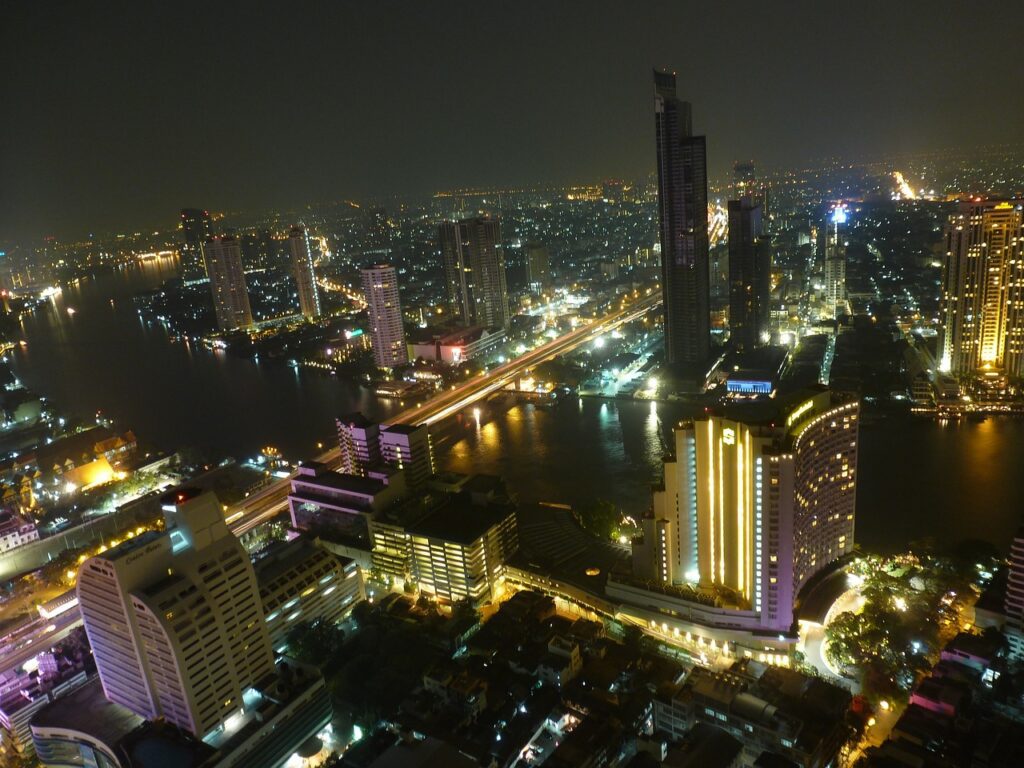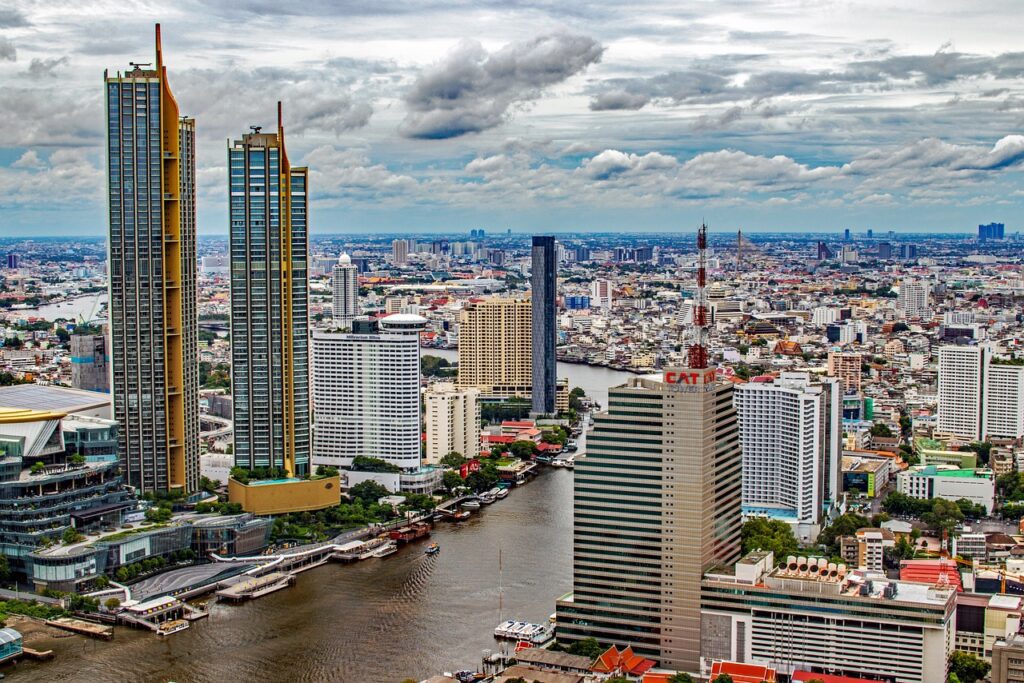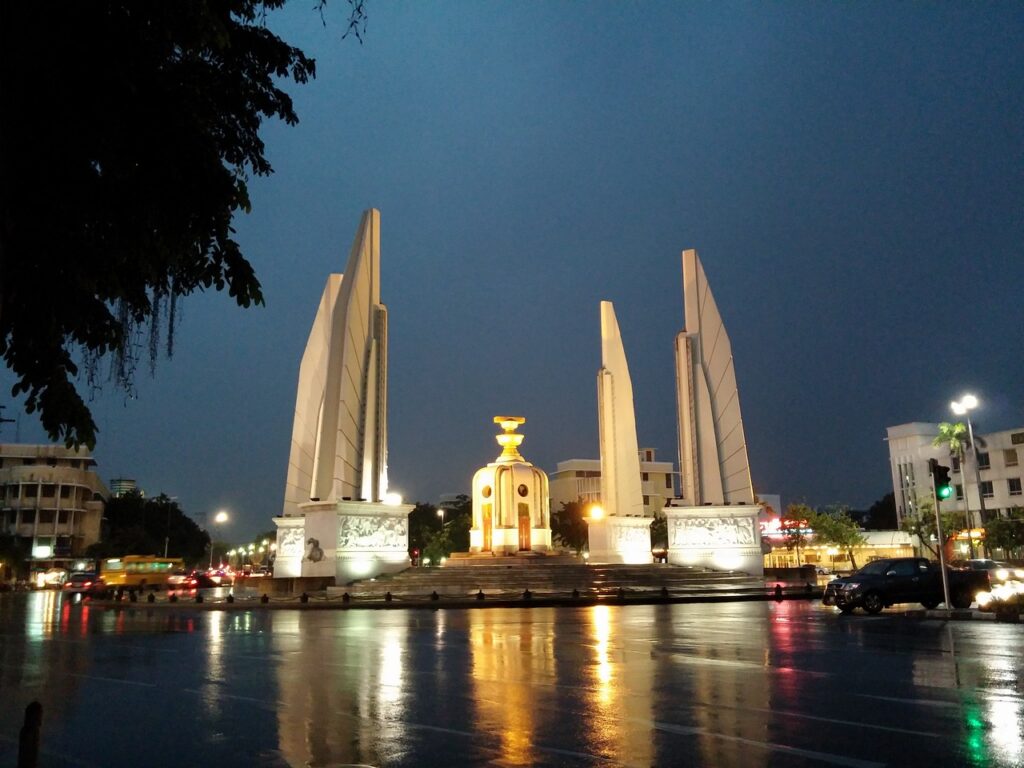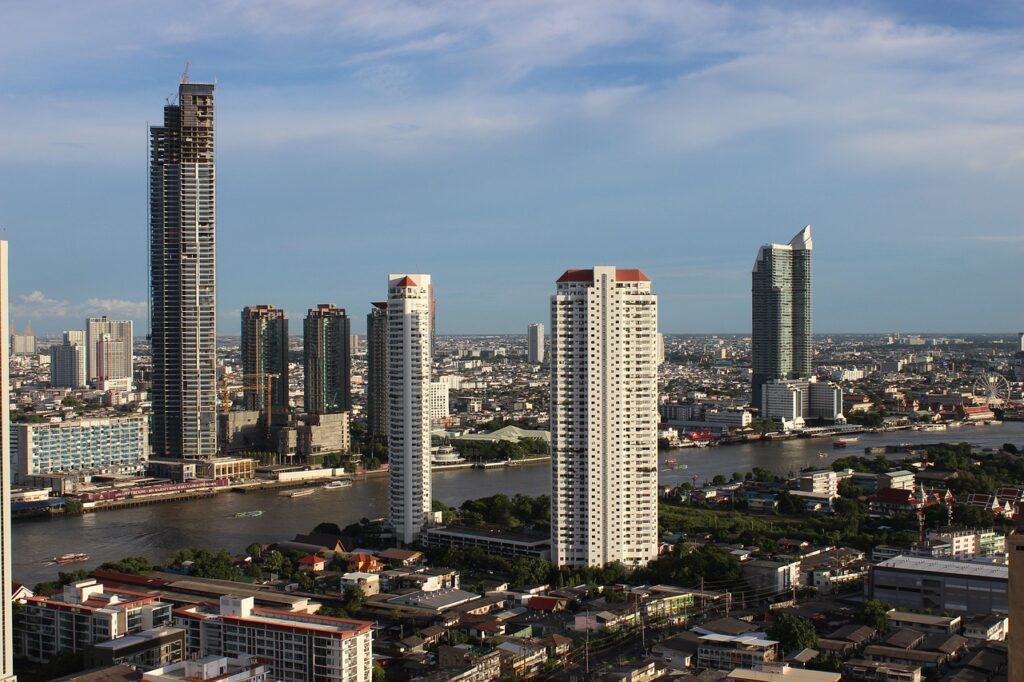Real estate investments in Thailand are gaining significant traction, with Koh Samui and Phuket standing out as prime locations for both local and foreign investors. These islands not only promise breathtaking natural beauty but also offer lucrative opportunities for those looking to invest in luxury villas, rental properties, or long-term growth. Deciding between the two, however, requires careful consideration, as each market presents its own set of advantages and challenges.

Whether you’re focused on high rental yields or capital appreciation, understanding the dynamics of both markets is essential. In this article, we’ll break down the key differences between Koh Samui and Phuket, offering valuable insights to help you make the right investment choice.
Market Overview: Koh Samui vs. Phuket
Real Estate Growth in Koh Samui
Koh Samui, Thailand’s second-largest island, has evolved into a desirable destination for tourists and real estate investors alike. Known for its stunning beaches, peaceful ambiance, and upscale boutique hotels, Koh Samui attracts high-net-worth individuals seeking a tropical retreat. The island’s real estate market has experienced steady growth over the past decade, particularly in the luxury villa segment. Investors are drawn to the potential for high rental yields, thanks to the growing demand for holiday homes and long-term rentals.
One key advantage of investing in Koh Samui is the island’s ability to balance infrastructural development with its natural beauty. The island’s luxury properties—especially those offering private pools, panoramic ocean views, and proximity to beaches like Chaweng and Lamai—remain highly sought after. Additionally, the steady flow of tourists supports strong demand for short-term rentals, while expatriates and retirees contribute to the market for long-term stays. This combination of factors has made Koh Samui an attractive investment destination for those looking to diversify their real estate portfolio.
Real Estate Boom in Phuket
Phuket, Thailand’s largest island, boasts a far more developed real estate market, catering to both luxury buyers and those seeking more affordable options. Unlike Koh Samui, Phuket has long been a well-established destination for property investment, offering a wide variety of options from high-end resorts to condominiums and commercial properties.
One of the key strengths of Phuket’s market is its robust infrastructure, including international schools, world-class hospitals, and a well-connected international airport. This international appeal has attracted foreign investors, many of whom purchase condominiums since Thai law allows foreigners to own them outright. The island also boasts a vibrant luxury villa market, with properties in areas like Kamala and Surin commanding premium prices. Villas with ocean views and private pools are particularly sought after by tourists and investors alike, especially in high-demand areas where exclusive developments drive up property values.
Phuket has established itself as a premium destination, with large-scale developments, such as luxury resorts and gated villa communities, making it an investment hotspot.
Investment Potential in Koh Samui
Koh Samui, one of Thailand’s most picturesque islands, presents significant investment potential for real estate investors worldwide. The island’s thriving tourism industry, coupled with its stunning natural beauty and expanding infrastructure, makes it an ideal location for those looking to invest in luxury properties, holiday villas, or eco-friendly developments. With its strategic location in the Gulf of Thailand, Koh Samui is easily accessible, further enhancing its attractiveness to both tourists and investors.
Rental Yields and Capital Appreciation
Koh Samui is recognized for its high rental yields, especially during peak tourist seasons. The demand for vacation rentals remains robust, with many tourists preferring to rent private luxury villas instead of staying in hotels. This trend has allowed property owners to capitalize on the booming tourism market, generating strong rental income from short-term vacation rentals.
The island’s occupancy rates during the high season can reach up to 90%, ensuring consistent cash flow for investors. Properties located near popular beaches like Chaweng and Lamai tend to command higher rental prices due to their proximity to entertainment and dining options.
Additionally, as the island’s infrastructure improves, particularly with new road developments, upgraded transport links, and expanding amenities like international schools and healthcare facilities, capital appreciation is expected to rise. Over the past few years, property values in Koh Samui have seen a steady increase, averaging around 5-10% annually.
The long-term prospects for real estate investment in Koh Samui remain optimistic, especially for those targeting luxury property or eco-friendly developments catering to tourists. The increasing popularity of sustainable tourism has led to a surge in demand for properties that are environmentally conscious, further boosting potential returns on investment.
Lifestyle Appeal and Affordability
One of the key factors driving real estate investment in Koh Samui is the island’s appeal as a quieter, more laid-back alternative to bustling destinations like Phuket. Investors often find that property prices in Koh Samui are more affordable than in Phuket, with a wider range of luxury villas available at competitive prices. For instance, a sea-view villa in Koh Samui might cost 20-30% less than a similar property in Phuket.
For those seeking an island lifestyle without the commercial buzz, Koh Samui’s slower pace and natural charm offer an attractive investment option, particularly for retirees or those seeking a second home. The island boasts pristine beaches, lush tropical landscapes, and a warm, welcoming community. The cost of living is relatively low, and there is an abundance of recreational activities, from water sports to yoga retreats, contributing to a high quality of life.
Furthermore, the local government is supportive of foreign investment, providing a stable environment for investors. With favorable exchange rates and a strong potential for capital growth, Koh Samui stands out as a prime location for real estate investment.

Investment Potential in Phuket
Phuket stands as one of Thailand’s most vibrant and sought-after destinations, offering immense investment potential for real estate enthusiasts. The island’s booming tourism industry, coupled with its advanced infrastructure, makes it a hotspot for international tourists and investors alike. Phuket’s allure lies in its stunning beaches, dynamic nightlife, and a plethora of luxury developments that cater to a high-end market.
High-End Developments and Tourism Infrastructure
Phuket’s real estate market is buoyed by its advanced tourism infrastructure, making it a prime destination for international tourists and investors. The presence of five-star resorts, private estates, and high-end condominiums makes it a compelling market for investors looking for long-term capital gains. Areas like Patong, Kamala, and Bang Tao are renowned for their luxury villas that offer breathtaking sea views and world-class amenities.
The island’s well-developed hospitality sector ensures a steady influx of high-spending tourists, creating consistent demand for vacation rentals. Rental yields in Phuket are strong, particularly in prime areas where luxury villas can command high rental rates during peak tourist seasons. The combination of high occupancy rates and premium rental prices allows investors to achieve attractive returns on investment.
Phuket’s international airport, extensive road networks, and modern facilities contribute to its robust tourism infrastructure. The government’s continuous investment in infrastructure projects enhances the island’s accessibility and appeal, further solidifying Phuket’s position as a top-tier destination for both tourists and real estate investors.
Property Values and Market Maturity
Phuket’s real estate market is more mature compared to Koh Samui, meaning that property values in certain areas may already be near their peak. While there are still opportunities for capital appreciation, particularly in emerging areas or new developments, investors may find it harder to secure high-growth investments compared to the up-and-coming market in Koh Samui.
However, Phuket’s well-established reputation as a global tourist hub ensures that property demand remains strong, providing investors with a level of security and long-term investment stability. The island attracts a diverse range of buyers, including expatriates, retirees, and international investors, which helps maintain a steady demand for properties.
Investors looking for luxury properties with immediate rental income may find Phuket appealing due to its mature market. The consistent demand for high-end accommodations ensures that rental yields remain competitive. Additionally, the island’s ongoing development projects and government support for tourism continue to enhance its attractiveness as a stable investment environment.
While Phuket’s real estate market may present fewer opportunities for rapid capital growth compared to emerging markets, it offers a reliable and stable option for investors seeking long-term returns and a foothold in one of Asia’s premier tourist destinations.
Challenges in the Real Estate Markets
The real estate markets in Thailand, particularly in popular destinations like Koh Samui and Phuket, present significant challenges that investors must consider. Understanding these obstacles is crucial for making informed decisions and ensuring a profitable investment. Two primary concerns are the legal considerations for foreign investors and the issues of market saturation and competition.
Legal Considerations for Foreign Investors
Both Koh Samui and Phuket are subject to Thai property laws, which impose certain restrictions on foreign ownership. While foreigners can own condominiums outright, purchasing land or villas typically requires more complex legal structures, such as long-term leases or forming Thai limited companies. Navigating these regulations can be challenging, so it’s crucial for investors to work with legal professionals to ensure compliance.
Experienced lawyers can assist in setting up the appropriate legal entities and guide investors through the intricacies of Thai property law. They can help structure deals that comply with regulations while protecting the investor’s interests. Additionally, understanding the legal processes involved in property transactions can prevent potential disputes and legal issues down the line.
Both markets also require investors to consider tax implications, such as property taxes and income tax on rental income. Thailand imposes specific taxes on property ownership and rental activities, which can affect the overall return on investment. Consulting with tax advisors who are familiar with Thai tax law can help investors plan accordingly and optimize their tax liabilities.
Moreover, foreign investors should be aware of the regulations concerning the repatriation of funds and foreign exchange controls. Compliance with these financial regulations is essential to ensure that profits can be legally transferred out of Thailand without penalties.

Market Saturation and Competition
Phuket’s real estate market faces market saturation in certain areas, particularly in the condominium sector. High competition among property owners means that rental yields can fluctuate based on supply and demand, particularly during low tourist seasons. An oversupply of properties can lead to decreased occupancy rates and lower rental income, affecting the profitability of investments.
In Koh Samui, while competition is not as intense, the smaller size of the island limits the available land for development, which can affect future supply. As tourism infrastructure continues to grow, maintaining the balance between demand and development will be essential for sustaining property values. Overdevelopment can lead to environmental degradation, which might deter tourists and reduce the island’s appeal.
Investors need to conduct thorough market research to identify the best opportunities. Understanding local market trends, tourist demographics, and occupancy rates can help in making strategic decisions. Diversifying investment portfolios and considering emerging areas with growth potential can also mitigate risks associated with market saturation.
Additionally, global events such as economic downturns or pandemics can significantly impact the tourism industry, leading to decreased demand for vacation rentals. Investors should factor in these potential risks and consider long-term strategies to ensure the resilience of their investments.
Which Market is Right for You?
Deciding between investing in Koh Samui and Phuket can be a pivotal choice that depends largely on your specific investment goals and preferences. Both islands are gems in Thailand’s real estate market, offering unique opportunities for investors seeking to capitalize on the country’s booming tourism industry and robust property market. Understanding the nuances of each market will help you make an informed decision that aligns with your financial objectives.
Choosing Between Koh Samui and Phuket
When deciding between Koh Samui and Phuket, it ultimately comes down to what you value most in an investment. If you’re looking for a quieter, more affordable market with the potential for long-term capital appreciation, Koh Samui may be the right choice. Its growing luxury villa market and rising tourism make it a solid investment for those looking to capitalize on both rental yields and lifestyle appeal.
In Koh Samui, property prices are generally lower than in Phuket, offering investors the chance to acquire premium real estate at more competitive rates. The island’s charm lies in its tranquil environment, pristine beaches, and a laid-back atmosphere that attracts tourists seeking relaxation and an escape from crowded destinations. This provides a strong foundation for generating consistent rental income from vacationers who prefer private holiday villas over traditional hotel accommodations.
Moreover, the potential for capital growth in Koh Samui is significant as the island continues to develop its infrastructure and amenities. Investors can take advantage of emerging areas that are poised for growth, potentially leading to substantial returns in the long term.
For investors who prefer a more established market with a larger tourist infrastructure and high-end developments, Phuket offers a range of investment opportunities in luxury real estate and condominiums. The island’s strong tourism industry and rental market provide more immediate returns, particularly for vacation rentals.
Phuket is Thailand’s largest island and one of the most popular tourist destinations in Asia. It boasts a well-developed infrastructure, including international schools, hospitals, shopping centers, and an international airport, making it highly accessible to global travelers. The presence of numerous five-star resorts, luxury villas, and entertainment options contributes to its reputation as a premier destination for high-end tourism.
Investing in Phuket allows you to tap into a mature market with a steady stream of high-spending tourists, ensuring robust rental yields and occupancy rates. The island’s real estate market is diverse, offering a wide array of properties from beachfront villas to upscale condominiums with panoramic sea views.
However, property prices in Phuket are generally higher due to its established status and demand. The competition among property owners is more intense, which can affect rental rates and capital appreciation potential. Nonetheless, the market’s stability and the island’s global appeal provide a level of security for investors seeking reliable returns.

Key Factors to Consider
- Investment Horizon: Determine whether you are looking for short-term gains or long-term capital appreciation. Koh Samui may offer greater growth potential over time, while Phuket provides immediate rental income opportunities.
- Budget: Assess your financial capacity. Koh Samui generally requires a lower initial investment compared to Phuket.
- Market Dynamics: Consider the level of market saturation. Phuket’s mature market may have less room for rapid growth, whereas Koh Samui’s developing market could present more opportunities.
- Lifestyle Preferences: If you plan to use the property personally, think about the lifestyle each island offers. Koh Samui is ideal for a peaceful retreat, while Phuket offers a more vibrant, cosmopolitan experience.
- Risk Tolerance: Evaluate your comfort with market risks. Emerging markets like Koh Samui may come with higher risks but also higher rewards.
- Legal and Tax Implications: Familiarize yourself with the legal considerations and tax regulations associated with foreign property ownership in Thailand.
Both Koh Samui and Phuket have their unique advantages and challenges. Your decision should align with your investment goals, financial capacity, and personal preferences. By carefully considering these factors and possibly consulting with real estate professionals, you can make a strategic investment that maximizes returns and suits your lifestyle.
Partnering with Heveatecture for Your Koh Samui Investment
Investing in Koh Samui’s thriving real estate market is a significant decision that requires local expertise and a trusted partner. Heveatecture, a leading real estate development and construction company on the island, offers unparalleled services to help you maximize your investment potential. With a deep understanding of Koh Samui’s property landscape, Heveatecture provides comprehensive solutions tailored to both seasoned investors and newcomers alike.
Expertise in Luxury Villa Development
Heveatecture specializes in the design and construction of luxury villas that meet the high demand from tourists seeking premium accommodations. Their projects are strategically located in prime areas to ensure optimal rental yields and capital appreciation. By incorporating modern amenities and exquisite architectural designs, Heveatecture’s villas stand out in the competitive market, attracting high-end clientele and ensuring consistent rental income.
Navigating Legal Considerations with Ease
Understanding the legal considerations for foreign investors in Thailand can be challenging. Heveatecture’s team of experts offers guidance on navigating Thai property laws, assisting with the complexities of property ownership, long-term leases, and company formations. Their local knowledge ensures that your investment is compliant with all regulations, providing peace of mind and a smooth transaction process.
Personalized Services and Market Insights
Choosing between Koh Samui and Phuket for your investment can be daunting. Heveatecture provides personalized consultations to help you determine which market aligns best with your investment goals. Their insights into market trends, property values, and future developments empower you to make informed decisions. Whether you seek the tranquility of Koh Samui or the bustling environment of Phuket, Heveatecture guides you every step of the way.
Commitment to Sustainable Development
Aligning with the global shift towards sustainability, Heveatecture is dedicated to developing eco-friendly developments. Their projects incorporate sustainable materials and energy-efficient technologies, catering to the growing demand for environmentally conscious properties. This commitment not only preserves Koh Samui’s natural beauty but also enhances the long-term value of your investment.
Conclusion
Investing in the real estate markets of Koh Samui and Phuket presents unique opportunities and challenges. Both islands offer attractive prospects for rental yields, capital appreciation, and a chance to be part of Thailand’s thriving tourism industry. Koh Samui appeals to investors seeking a quieter, emerging market with potential for significant growth and more affordable entry points, especially in the luxury villa segment. Its natural charm and developing infrastructure make it ideal for those looking to capitalize on an up-and-coming destination.
On the other hand, Phuket provides a more established and stable investment environment, backed by advanced infrastructure and a robust tourist influx. The island’s mature market offers immediate returns and a variety of high-end properties, including luxury villas and condominiums in prime locations. While property prices are higher, the consistent demand from international tourists ensures sustained rental income and long-term investment security.
Ultimately, the choice between Koh Samui and Phuket depends on your investment goals, risk tolerance, and personal preferences. By understanding the dynamics of each market and considering factors such as legal considerations, market saturation, and lifestyle appeal, you can make an informed decision that aligns with your objectives. Partnering with experienced professionals and companies specializing in these regions can further enhance your investment journey, ensuring compliance and maximizing returns in Thailand’s vibrant real estate landscape.
FAQs
To assist you further in making an informed decision, we’ve compiled a list of frequently asked questions regarding real estate investment in Koh Samui and Phuket. These answers include relevant insights and address common concerns among investors.
It depends on your investment goals. Koh Samui offers lower entry prices and potential for long-term capital appreciation, making it ideal for investors looking for emerging market opportunities and a tranquil environment. On the other hand, Phuket has a more established market with higher tourist traffic, offering immediate rental income and a stable investment environment.
Both markets offer high rental yields, but Koh Samui typically provides better returns for luxury villas, especially those catering to high-end tourists seeking private accommodations. Phuket excels in high-demand tourist areas where vacation rentals command premium rates, particularly in locations like Patong and Kamala.
Yes, foreigners can own condominiums outright in both Koh Samui and Phuket. However, owning land or villas requires more complex legal structures due to Thai property laws. Common methods include long-term lease agreements or setting up a Thai limited company. It’s crucial to consult with legal professionals to navigate these regulations effectively.
Phuket has more developed infrastructure, including an international airport, luxury resorts, hospitals, and shopping centers. This advanced infrastructure supports a high volume of tourists and expatriates, making it attractive for investors seeking an established market. Koh Samui is growing but remains less commercialized, offering a more laid-back atmosphere with essential amenities.
Property prices in Phuket are generally higher due to its established market and advanced infrastructure. Koh Samui offers more affordable options, particularly for luxury villas, making it appealing for investors with a moderate budget seeking potential for significant capital growth.
Foreigners face restrictions on owning land in Thailand, which can pose legal challenges when investing in real estate. While you can own condos outright, investing in villas or land requires navigating complex legal arrangements like long-term leases or forming a Thai company. Understanding tax implications, property laws, and ensuring compliance is essential. Professional legal advice is highly recommended.
Koh Samui may offer higher long-term capital appreciation due to its emerging market status and ongoing development projects. As infrastructure improves and tourism grows, property values are expected to rise. Phuket’s market is more mature and stable; while appreciation is still possible, the growth rate may be slower compared to Koh Samui.
In Phuket, luxury villas, beachfront properties, and high-end condominiums are in high demand, especially in prime tourist areas like Patong, Kamala, and Bang Tao. These properties attract affluent tourists and expatriates seeking premium accommodations with top-notch amenities.
Phuket has a larger and more developed tourism market, attracting millions of visitors annually from around the world. Koh Samui is gaining traction as a boutique destination for high-net-worth tourists seeking a more exclusive and serene environment. While its tourism market is smaller, it offers unique opportunities for investors targeting niche markets.
Phuket offers more investment security due to its established infrastructure and consistent tourist demand. Investors may find it a safer choice for steady returns. Koh Samui provides emerging opportunities with potential for significant growth but may come with higher risks associated with developing markets. Your choice should align with your risk tolerance and investment strategy.
